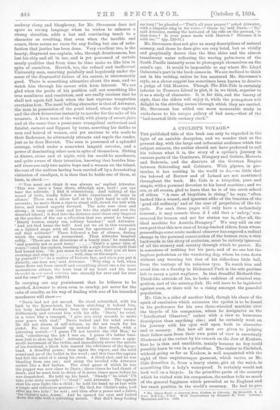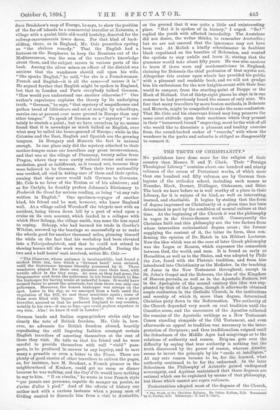A CYCLIST'S VOYAGE.*
THE published title of this book can only be regarded in the light of an amiable deception, and we wonder that at the present day, with the large and influential audience which the subject attracts, the author should not have preferred to call his volume what it is, the story of a cyclist's journey in various parts of the Continent, Hungary and Galicia, Moravia and Bohemia, and the districts of the German Empire between Schirnding and Coblentz. With gipsies, in par- ticular, it has nothing in the world to do,—so little that the beloved of Borrow and of Leland are not mentioned throughout the book. Mr. Cole is a tricyclist, pure and simple, with a personal devotion to his loved machine ; and we are, at all events, glad to learn that he is of the erect school of riders. " A race of bicyclists is rising," he says, "often backed like a weasel, and ignorant alike of the beauties of the good old ordinary,' and of the ease of propulsion of the tri- cycle. For such these pages will only have a melancholy interest ; it may console them if I add that a safety,' con- structed for human and not for simian use is, after all, the ideal machine for Austria-Hungary." We may add on our own part that this new race of hump-backed riders, from whose proceedings some acute medical observer has augured a radical change in the personal construction of the human race, a step backwards in the story of evolution, must be entirely ignorant of all the scenery and country through which he passes. He is conscious of nothing but his pace, and of no one but the hapless pedestrian or the wandering dog, whom he rune down without any warning but that of his ridiculous little bell, from the vantage of his noiseless tyre. To watch him and avoid him on a Sunday in Richmond Park is the sole pastime left to many a quiet wayfarer. In that dreadful Richard-the- Third-like attitude of his, he looks redolent of criminal sug- gestion, and of the missing-link. He will have to be legislated against soon, or there will be a rising amongst the peaceful population.
Mr. Cole is a rider of another kind, though his share of the spirit of emulation which animates the cyclist is to be found in his preference for his own three-wheeled machine over the bicycle of his companion, whom he designates as the " Intellectual Observer," rather with a view to humorous description than anything else; and he certainly went on his journey with his eyes well open both to character and to scenery. But how all men are given to judging their fellow-men from their own point of view is amusingly illustrated at the outset by his remark on the Jew of Krakow, that he is thin and unathletic, mainly because no boy could possibly learn to run in a gabardine. The visitor to Carlsbad, without going so far as Krakow, is well acquainted with the sight of that unpicturesque garment, which varies, as Mr. Cole describes it, from a heavy ulster, girt at the waist, to something like a lady's waterproof. It certainly would not look well on a bicycle. In the primitive parts of the country which he visited with his companion, the author tells us much of the general fogginess which prevailed as to England and her exact position in the world's economy. He had to pro- Ovphii Road: a Journey from Krakow to Cobionts. By Grouvillo A. J. Colo, M.R.IA.. F.G.S. With Illustrations by Edmund H. Row. London: Macmillan and Co. 1594. duce Bradshaw's map of Europe, he says, to show the position of the far-off islands to a commercial traveller at Zabornia, a village with a quaint little old-world hostelry, deserted for the railway-caravanserais lower down. For that kind of back- sliding, there, as in England, Mr. Cole prescribes cycling as "the obvious remedy." That the English had a fortress on the Bosphorus to keep the Russians out of the Mediterranean, was the sum of the traveller's knowledge about them, and the subject recurs in various parts of the book. Among the silver mines an officer of the district was anxious that the wanderers should call upon his wife. " She speaks English," he said, " for she is a Frenchwoman. French and English—it is all the same—of course it is." He argued further that English might be spoken in England, but that in London and Paris everybody talked German. "How would you understand one another otherwise P" Our author's experience explains the theory by its underlying truth. " German," he says, " that mystery of magnificence and pathos loved of litt4rateurs and set at nought by schoolboys, carries one at present over more ground in Europe than any other tongue." To speak of German as a " mystery " is cer- tainly to stretch a point ; but we have ourselves by no means found that it is nowadays as much talked as English, over what may be called the home-ground of Europe ; while in the Colonies and the East, English and Spanish are the growing tongues. In Hungary and Moravia the fact is natural enough. In one place only did the mystery attached to their mother-tongue cause our travellers any great inconvenience, and that was at the village of Plesmany, twenty miles from Prague, where they were curtly refused rooms and accom- modation, good or indifferent, as it turned out, because they were believed to be German. When their true nationality was verified, all vied in taking care of them and their cycles, owning that they never would talk German to Germans. Mr. Cole is no lover of the Teuton or of his admirers ; and as for Carlyle, he frankly prefers Johnson's Dictionary to Frederick the Great for serious reading, as being "at any rate written in English." One specimen-voyager of another kind, his friend and he met, however, who knew England well. At a village called Wersdorff the tricycle met with an accident, being blown down hill by a gust of wind upon a cruise on its own account, which landed in a collapse with which Herr Schopp, the village smith, was none the less equal to coping. Schopp, who had learned his trade in Goethe's Witzlar, screwed up the bearings so successfully as to make the wheels good for another thousand miles, pluming himself the while on the fact that his workshop had been elevated into a Velocipedenlabrik, and that he could not attend to shoeing horses till the work was accomplished. During the two and a half hours' wait involved, writes Mr. Cole :- " The Observer, whose patience is inexhaustible, had found a modest little inn, into which a German band' soon entered, until the ■P astzimmer became literally possessed by it. These wanderers played for their own pleasure over their beer, with terrific effect in the tiny room. As soon as they had gone, the burgomaster sent down the policeman in his brass helmet to fine the innkeeper for having music at unlawful hours. It would have seemed fairer to arrest the minstrels, but then there was only one policeman. Moreover, the honest innkeeper was always on the spot. Later in the day, as we emerged from a bath amid the vegetation of the Dill, we met those musicians again ; some of them were filled with liquor. Their leader, who was a great traveller, assured us that he preferred England to any country, notably to his own—it was so free—you could perform anywhere at any time. Alas ! we knew it well in London !"
German bands and Italian organ-grinders strike only too clearly the note of British freedom. Mr. Cole is, how- ever, no advocate for British freedom abroad, heartily repudiating the still lingering fashion amongst certain English travellers of asserting themselves at the cost of those they visit. He tells us that his friend and he were careful to provide themselves with well " visa " pass- ports, to be produced in answer to any inquiry, and to save many a grumble or even a letter to the Times. There are plenty of good stories of other travellers to enliven the pages, as, for instance, how M. Beudant, a French pioneer in the neighbourhood of Krakow, could get no room or dinner because he was walking, and the Uerf d' Or would have nothing to say to him. " Il en riisulte," he wrote in true French style " que jamais sine personne, capable do manger un poulet, ne s'avise d'aller h pied." And of the effects of history our author met with a curious instance when a young man of Goding wanted to dissuade him from a visit to Austerlitz,
on the ground that it was quite a little and uninteresting place. " But it is spoken of in history," I urged. " So P replied the youth with affected incredulity. The Austrians did not desire, the writer thinks, to remember Austerlitz; but we are not assured that the ignorance may not have been real. At Melink a kindly schoolmaster in faultless black expatiated on the beauties of Bohemian, and wanted the cyclists to stay awhile and learn it, stating that the grammar would take about fifty years. He was also anxious to learn if there were any mathematicians in England, claiming for Bohemia the chief profession of that mystic art. Altogether this cruiser upon wheels has provided his public with a pleasant and readable book, and we will not grudge him his enthusiasm for the new knights-errant with their free world to conquer, from the starting-point of Dieppe or the Hook of Holland. Out of thirty-eight places he slept in in one summer he had previously heard the names of only nine. We fear that many travellers by more beaten methods, in Bohemia and Moravia, might be compelled to make the same confession. That Mr. Cole and his observant friend may long preserve the same erect attitude upon their machines which they present in their " homeward-bound " engraving, must be the wish of all who would like to dissociate a pleasant and healthy exercise from the round-backed seeker of " records," with whom the wanderer in the parks and suburbs is obliged so disagreeably to connect it.







































 Previous page
Previous page